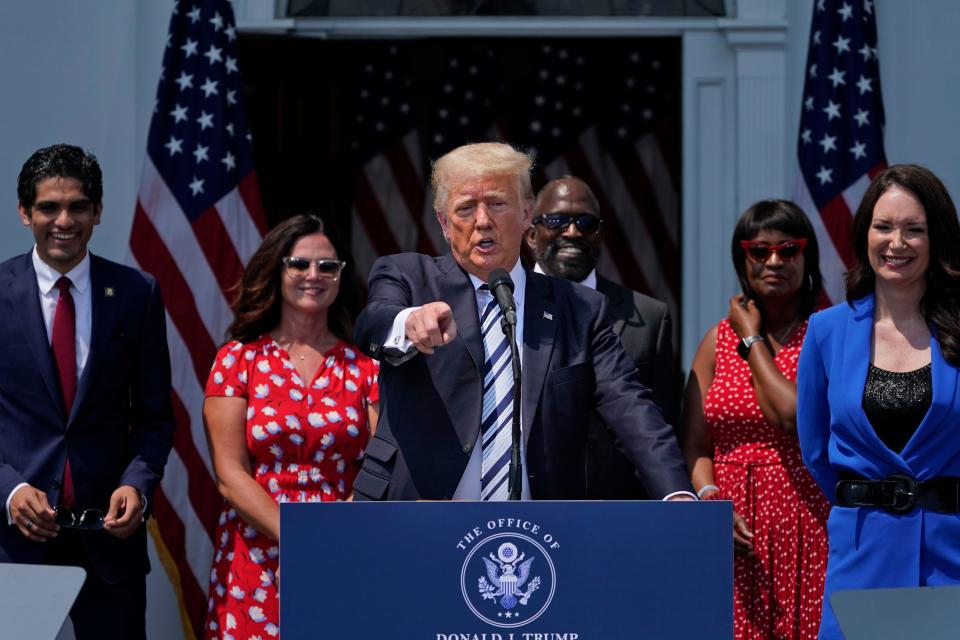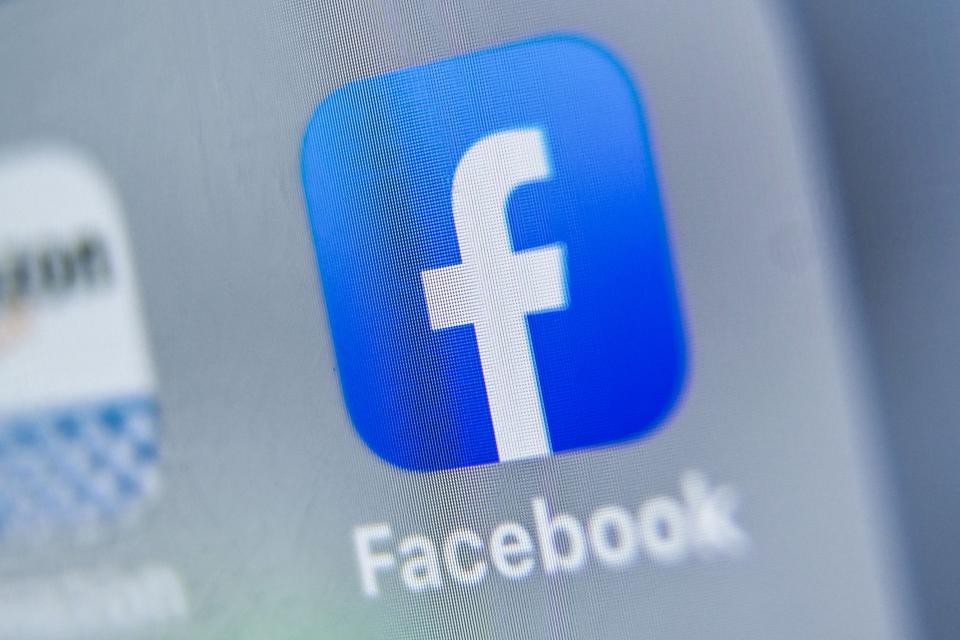Do Facebook and Google censor conservatives? Trump, Republicans bet claims they do will rally GOP base in 2022
- Oops!Something went wrong.Please try again later.
- Oops!Something went wrong.Please try again later.
From legislation in statehouses across the country to a lawsuit from Donald Trump, the Republican claim that powerful technology companies are biased against conservatives is emerging as a top issue to rally the base in the 2022 midterm elections.
Anti-tech sentiment may not gin up quite as much partisan fervor as the border wall, critical race theory, abortion or guns, but it's still a popular applause line with a GOP base devoted to the former president.
Online censorship accusations, in particular, resonate with conservative voters and could boost voter registration, turnout and fundraising as the GOP tries to retake the House and Senate, political observers say.
“It’s a device to win elections and to keep their supporters riled up and angry and turn them out,” said Geoffrey Kabaservice, vice president of political studies at the Niskanen Center.
Conservatives recently doubled down on claims that tech companies censor their speech after the Biden administration pressured Facebook to crack down on COVID-19 vaccine misinformation.
“The blatant actions by your administration to work with big tech companies to censor Americans’ free speech are shocking – and arguably a violation of the First Amendment,” Tennessee Republican Sen. Marsha Blackburn wrote the White House.
Trump, who was suspended from the major social media platforms after the Jan. 6 insurrection, escalated his war with Big Tech in July when he filed suit against Facebook, Google and Twitter and their CEOs, claiming the companies violated his First Amendment rights.
Trump and Republicans fundraised off the lawsuit, though legal experts say it has virtually no chance of success.
Dozens of states are considering legislation that targets how social media platforms regulate speech.
One bill passed in Florida, but was temporarily blocked by a federal judge. Another in Texas had the votes it needed in a special session of the Republican-controlled legislature, but is in limbo after Democrats left the state for Washington to protest a GOP effort to overhaul the state election system.
Both states have Republican governors who are widely seen as possible 2024 presidential contenders.
►Banning Trump from Facebook: Why Justice Clarence Thomas and other conservatives say it is First Amendment issue
►The more you know: What the First Amendment protects – and what it doesn't
The First Amendment protects people from censorship by the federal government, not from content moderation decisions by private companies. Social media companies say they don't target conservatives, only harmful speech that violates their rules.
Facebook, Google’s YouTube and Twitter say they banned Trump over concerns he would incite further violence after his followers stormed the Capitol building to block Congress from certifying Biden’s presidential win.
Twitter and Snapchat permanently banned Trump after the Jan. 6 attack on the Capitol. YouTube said it would lift the suspension after the "risk of violence" decreases. In June, Facebook said the earliest Trump would regain access to his accounts would be 2023.
“A large part of Trump’s appeal was precisely this idea that the real America is having their country taken away from them by big forces that include big government, Democrats, the deep state and powerful and unaccountable corporations," Kabaservice said.
The perception that tech companies and the billionaire CEOs who run them are biased against conservatives has been around for a long time, but intensified as Trump made “social media abuses” a major plank of his administration and reelection campaign. After he lost the presidency, Trump vilified tech companies for labeling or removing posts that spread falsehoods about the outcome of the presidential election.
Some conservatives criticize tech companies for regulating speech on their platforms, claiming their First Amendment rights are violated when posts are labeled or removed or when they are banned for violating company policies.
The argument that social media platforms are public forums that should have congressional oversight has picked up.
Conservative U.S. Supreme Court Justice Clarence Thomas has questioned the constitutionality of private companies controlling user content. Section 230 of the Communications Decency Act of 1996 grants social media platforms legal immunity for removing posts that violate their policies.
Republican Reps. Cathy McMorris Rodgers and Jim Jordan on Wednesday released draft legislation that would strip tech companies who censor "constitutionally protected speech" on their platforms of their Section 230 protections.
Complaints of ideological bias come from across the political spectrum, but it’s difficult to prove social media platforms are targeting any one group since the tech companies disclose so little about how they decide what content is allowed and what is not.

Researchers say they’ve found no evidence to support GOP grievances that social media companies stifle conservative voices. If anything, they say, social media platforms amplify the voices of conservatives, shaping the worldviews of millions of voters.
But for some conservatives, the 2020 election proved Big Tech's ideological bias. They point to tech companies throttling the spread of a New York Post article which made uncorroborated claims about Hunter Biden’s business dealings, the Trump bans and the takedown of Parler, a social media platform popular with the political right.
Nine in 10 Republicans and independents who lean toward the Republican Party say it’s at least somewhat likely that social media platforms censor political viewpoints they find objectionable, up slightly from 85% in 2018, according to an August report from the Pew Research Center.
►Facebook after Trump suspension: Political speech of world leaders will get less preferential treatment
Kara Frederick, a research fellow in in the Center for Technology Policy at The Heritage Foundation, says conservatives are upset at the lack of transparency on how content moderation decisions are made and the lack of recourse after they are made, a frustration shared by anyone who has had to navigate being thrown into "Facebook jail," regardless of ideology.
“Conservatives think something needs to be done to curtail these really out-of-control, power-drunk tech companies,” said Frederick, a former Facebook staffer. “It is important to show that conservatives are resolved to do something about the inordinate targeting of conservatives."
That resolve is whipping through statehouses across the country. Conservative think tank The Heartland Institute recently estimated that 70 bills in 30 states are challenging “big tech censorship.”
“The volume of bills across the nation is indicative of the fact that many Americans recognize we are entering into a dangerous period for political free speech,” Samantha Fillmore, a state government relations manager at The Heartland Institute, said in testimony before the Texas Senate in July.
Though few of the bills have gotten very far, Florida became the first state to push through legislation to force social media companies to allow speech even if it violates their rules over objections from the tech industry which called it a "frontal assault on the First Amendment."
Gov. Ron DeSantis, a Trump ally, signed the bill into law in May that would penalize social media companies for removing or barring the speech of politicians, but a federal judge blocked it before it could take effect in July. DeSantis is appealing.
►Facebook, YouTube censorship: Facebook, YouTube and Twitter lawsuit challenges Trump-inspired Florida law banning ‘censorship' of conservatives
Another bill in Texas would allow any Texas resident temporarily or permanently banned from Facebook, Twitter or YouTube to sue the companies. It’s backed by Texas Gov. Greg Abbott, who is facing his first challenging Republican primary.
“Big Tech’s efforts to silence conservative viewpoints is un-American, un-Texan and unacceptable and pretty soon it’s going to be against the law in the state of Texas,” Abbott said at a news conference in March.

State Sen. Bryan Hughes, a Republican and the bill's author, accused social media companies of enforcing silence "if you have a viewpoint different from theirs."
Steve DelBianco, president and CEO of NetChoice, a trade group which represents tech companies, challenged the legislation in Florida and Texas.
“After a federal court ruled Florida’s law( violated the First Amendment, I testified in Texas on how their bill had the same First Amendment flaws as Florida,” DelBianco said. “But that didn’t trouble Texas Republican lawmakers, who are so interested in scoring political points that they voted for a bill that would allow awful user posts on social media, like pornography, ethnic slurs, and vaccine disinformation.”
James Henson, director of the Texas Politics Project at the University of Texas in Austin, says taking on Big Tech is one way incumbent Republicans can show their dedication to conservative causes that resonate, especially with GOP primary voters.
“Republican elected officials here have tried to put everything on the menu that they think Republican primary voters are in the mood to order and this is one of those things,” Henson said.
Even if anti-tech legislation gets bogged down in the courts, Republicans will still rack up cable news appearances and political points, said Aubrey Jewett, a political science professor at University of Central Florida.
“This is a golden issue for conservative Republicans,” Jewett said.
This article originally appeared on USA TODAY: Trump, GOP rally base with claims that Facebook censors conservatives

